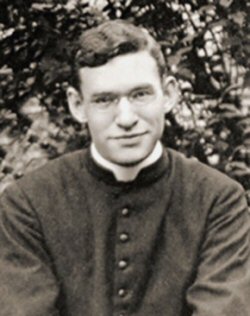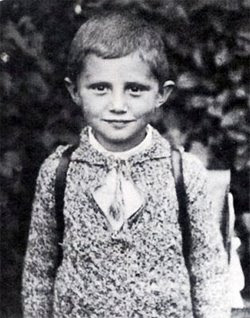
Buzzworthy Sisters in Habits Headed to Va. School
Nashville Dominicans Known for Youth, Adherence to Traditions
By Michelle Boorstein
Washington Post Staff Writer
Sunday, November 25, 2007; A01
People wait an hour in line to talk with her, pack standing room only into a bar to hear her, and some even squeal when they see her, this woman in a sister's habit.
She is Sister Mary Jordan Hoover, principal of Northern Virginia's first new Catholic high school in two decades, a $60 million state-of-the-art project that will open in Dumfries next fall. At a time when it's possible to count on one hand the number of Catholic secondary schools that open each year in the nation, her arrival in Virginia represents good news for supporters of Catholic schools.
But the cheery 42-year-old brings another major layer of buzz to the Arlington Diocese because she is a member of the Nashville Dominicans, rock stars in the world of Catholic religious orders. Although the number of religious sisters in the United States has plunged since the 1960s, resulting in an average age of about 70, there has been an increase in recent years among traditional, habit-wearing orders, including the Nashville-based Dominican Sisters of St. Cecilia, which has 226 members and a median age of 35. It recently raised $46 million to expand its chapel because the sisters were spilling into the hall.
In her floor-length white habit with black veil and a rosary around her waist, Hoover is the picture of affirmation for traditional dioceses, including Arlington's.
And that makes her a hot property. With a stated mission of teaching, the Nashville Dominicans get letters and phone calls almost daily from dioceses across the country, asking that they send their youthful -- and overtly devout -- vibe to one school or another.
"The bishops are circling Nashville," said Timothy McNiff, schools superintendent in the Arlington Diocese, who introduced Hoover at an open house in Woodbridge this month for the new school, which will be called Pope John Paul the Great Catholic High School. Officials have a target enrollment of 475 next fall for the four-year school.
More than 150 people came to what was about the 20th such event in the past couple of months, including one in a packed Irish pub in Alexandria. McNiff himself has been to Nashville six times.
There is little detailed research on women who join Catholic religious orders -- called "women religious," "sisters" or often "nuns," although technically that means a woman who is cloistered. Although traditional orders make up a small slice of the pie, they are where the growth is.
"This generation is more conventional in their outlook and more traditional in values," said Brother Paul Bednarczyk, executive director of the National Religious Vocations Conference. "Given the relativity of our culture, they really want to know what it means to be Catholic, and symbols -- like habits -- speak to them deeply. They want people to know they have made this radical choice."
Some experts say the growth of traditional groups is because their work goals of teaching and nursing, for example, have remained clear; they haven't strayed as much as more progressive orders into a broader array of careers where they often live and work alone, apart from their sisters. Others say they are the natural result of Pope John Paul II's papacy, during which the church refocused on its orthodox roots after the social turbulence of the 1960s and '70s. Some think their meditative lifestyles are simply more attractive in an era of nonstop communication.
Regardless, a sister in a habit makes clear what is unique about Catholic schools at a time when there are hundreds of thousands fewer students there than a decade ago.
"If Catholic schools don't look any different and use the same textbooks and have the same teachers and the same standards, why have them?" asked Sister Patricia Wittberg, a sociologist at Indiana University-Purdue University Indianapolis who studies religious orders. One way to distinguish yourself is "to get a bunch of women in habits in there. They are icons of Catholicity in a diocese that wants Catholicity."
The Nashville Dominicans stick out even within the traditional group because their identity has been so solid, said Michael Wick, executive director of the Institute on Religious Life, which is affiliated with the conservative Council of Major Superiors of Women Religious. They have never veered from teaching, and they move to new cities in groups so they can stick to their schedule: wake at the same time, pray and chant together three times a day, meditate together, eat together in silence. Their reputation is of being upbeat and young; promotional material shows them playing soccer and walking on the beach.
"They have always been clear as to what their identity is as a community and how it's expressed. If you diversify your ministry so much, it's hard to say what your community does," Wick said. "And young attracts young. I think other [traditional orders] are learning from them."
The Nashville Dominicans' growth started about 15 years ago. At the time, about three or four women would join each year. Since then, the number has jumped to about 10 to 15. From 1965 to 2000, the most recent year for which data are available, the number of women religious in the country dropped 54 percent to about 80,000.
The audience at the recent high school open house was stirred to applaud after McNiff rattled off some of the features of the new school: a glass-walled cafeteria with "bistro-style seating" overlooking the woods, 11 life-size statues of saints, three athletic fields, a 500-seat auditorium. "But all of this would be for naught if we didn't have adults who are willing to wear their faith on their sleeves," he said in introducing Hoover to loud applause.
The school will be the single largest expenditure of Bishop Paul S. Loverde's eight-year tenure. The money will come from bonds, a capital campaign that has raised $12.5 million so far and fundraising. The land, worth $14.5 million, was given to the diocese and isn't included in the $60 million cost. Construction is expected to continue into next summer.
Arlington is an exception to the national norm, with its school enrollment increasing 15 percent over the past decade to 18,500 students, due in part to population growth in the region. Diocesan officials say this helped them attract Hoover, a trumpet-playing sports fan who was once a resident assistant in a college dorm, and two other sisters from Nashville.
Arlington also has what is considered one of the nation's more conservative dioceses and was one of only two -- along with Lincoln, Neb. -- to ban female altar servers until Loverde lifted the ban last year.
Religious sisters and brothers and priests haven't vanished from Catholic schools: There are 42 out of 1,200 full-time professional staffers in the Arlington Diocese's school system. Nationally, the percentage is about 4.4 percent, according to the National Catholic Education Association.
But the religious life is remote to most American Catholics. When Hoover gave a lecture in August at Pat Troy's Ireland's Own pub in Old Town Alexandria to a group of young Catholics, she went through the basics of how sisters differ from nuns, what a habit is, what it means to be chaste. "It means to give our entire being to the Lord. We don't become neutered; we're still real women," she said in her upbeat, teacherly cadence.
Only four Catholic secondary schools opened nationally last year, so the opening of a high school is rare. And this school is even more so: Pope John Paul will have an extensive bioethics curriculum required for all four years, a first for a U.S. Catholic high school, according to the National Catholic Bioethics Center, the country's largest Catholic think tank. This was a major draw for the Nashville Dominicans, who are writing the curriculum as well as running the school.
At the open house at St. Thomas Aquinas Regional School in Woodbridge, Marie Meyer and Stephanie DeRaymond beamed as a 50-person line waited to talk to Hoover.
"I'd love my children to be taught by a nun! It's just unheard of, especially in this day and age," said DeRaymond, a 41-year-old mother of two, practically squealing. "They're going to say 'No' to a nun? Not do their homework?"
Meyer, 39, a mother of three, nodded in agreement: "To have them be taught by nuns in a habit -- that alone will make a major difference."
Across the room, Maria Moghtadaie and Tania Kestermann, both parents from Woodbridge, reminisced about sisters who taught them when they were growing up. Moghtadaie remembered being ordered to kneel for hours in a public hallway; Kestermann remembered being told to slap her own face.
"There weren't nuns like the Dominicans. They're happy, open," said Moghtadaie, 44, who works in sales.
Kestermann, 38, who does clerical work part time, agreed. "I looked at them as distant," she recalled about the sisters of her childhood. But today, sisters know music and the Internet, she said. "You see them dancing, interacting with the kids. That's the Dominicans."
Nashville Dominicans Known for Youth, Adherence to Traditions
By Michelle Boorstein
Washington Post Staff Writer
Sunday, November 25, 2007; A01
People wait an hour in line to talk with her, pack standing room only into a bar to hear her, and some even squeal when they see her, this woman in a sister's habit.
She is Sister Mary Jordan Hoover, principal of Northern Virginia's first new Catholic high school in two decades, a $60 million state-of-the-art project that will open in Dumfries next fall. At a time when it's possible to count on one hand the number of Catholic secondary schools that open each year in the nation, her arrival in Virginia represents good news for supporters of Catholic schools.
But the cheery 42-year-old brings another major layer of buzz to the Arlington Diocese because she is a member of the Nashville Dominicans, rock stars in the world of Catholic religious orders. Although the number of religious sisters in the United States has plunged since the 1960s, resulting in an average age of about 70, there has been an increase in recent years among traditional, habit-wearing orders, including the Nashville-based Dominican Sisters of St. Cecilia, which has 226 members and a median age of 35. It recently raised $46 million to expand its chapel because the sisters were spilling into the hall.
In her floor-length white habit with black veil and a rosary around her waist, Hoover is the picture of affirmation for traditional dioceses, including Arlington's.
And that makes her a hot property. With a stated mission of teaching, the Nashville Dominicans get letters and phone calls almost daily from dioceses across the country, asking that they send their youthful -- and overtly devout -- vibe to one school or another.
"The bishops are circling Nashville," said Timothy McNiff, schools superintendent in the Arlington Diocese, who introduced Hoover at an open house in Woodbridge this month for the new school, which will be called Pope John Paul the Great Catholic High School. Officials have a target enrollment of 475 next fall for the four-year school.
More than 150 people came to what was about the 20th such event in the past couple of months, including one in a packed Irish pub in Alexandria. McNiff himself has been to Nashville six times.
There is little detailed research on women who join Catholic religious orders -- called "women religious," "sisters" or often "nuns," although technically that means a woman who is cloistered. Although traditional orders make up a small slice of the pie, they are where the growth is.
"This generation is more conventional in their outlook and more traditional in values," said Brother Paul Bednarczyk, executive director of the National Religious Vocations Conference. "Given the relativity of our culture, they really want to know what it means to be Catholic, and symbols -- like habits -- speak to them deeply. They want people to know they have made this radical choice."
Some experts say the growth of traditional groups is because their work goals of teaching and nursing, for example, have remained clear; they haven't strayed as much as more progressive orders into a broader array of careers where they often live and work alone, apart from their sisters. Others say they are the natural result of Pope John Paul II's papacy, during which the church refocused on its orthodox roots after the social turbulence of the 1960s and '70s. Some think their meditative lifestyles are simply more attractive in an era of nonstop communication.
Regardless, a sister in a habit makes clear what is unique about Catholic schools at a time when there are hundreds of thousands fewer students there than a decade ago.
"If Catholic schools don't look any different and use the same textbooks and have the same teachers and the same standards, why have them?" asked Sister Patricia Wittberg, a sociologist at Indiana University-Purdue University Indianapolis who studies religious orders. One way to distinguish yourself is "to get a bunch of women in habits in there. They are icons of Catholicity in a diocese that wants Catholicity."
The Nashville Dominicans stick out even within the traditional group because their identity has been so solid, said Michael Wick, executive director of the Institute on Religious Life, which is affiliated with the conservative Council of Major Superiors of Women Religious. They have never veered from teaching, and they move to new cities in groups so they can stick to their schedule: wake at the same time, pray and chant together three times a day, meditate together, eat together in silence. Their reputation is of being upbeat and young; promotional material shows them playing soccer and walking on the beach.
"They have always been clear as to what their identity is as a community and how it's expressed. If you diversify your ministry so much, it's hard to say what your community does," Wick said. "And young attracts young. I think other [traditional orders] are learning from them."
The Nashville Dominicans' growth started about 15 years ago. At the time, about three or four women would join each year. Since then, the number has jumped to about 10 to 15. From 1965 to 2000, the most recent year for which data are available, the number of women religious in the country dropped 54 percent to about 80,000.
The audience at the recent high school open house was stirred to applaud after McNiff rattled off some of the features of the new school: a glass-walled cafeteria with "bistro-style seating" overlooking the woods, 11 life-size statues of saints, three athletic fields, a 500-seat auditorium. "But all of this would be for naught if we didn't have adults who are willing to wear their faith on their sleeves," he said in introducing Hoover to loud applause.
The school will be the single largest expenditure of Bishop Paul S. Loverde's eight-year tenure. The money will come from bonds, a capital campaign that has raised $12.5 million so far and fundraising. The land, worth $14.5 million, was given to the diocese and isn't included in the $60 million cost. Construction is expected to continue into next summer.
Arlington is an exception to the national norm, with its school enrollment increasing 15 percent over the past decade to 18,500 students, due in part to population growth in the region. Diocesan officials say this helped them attract Hoover, a trumpet-playing sports fan who was once a resident assistant in a college dorm, and two other sisters from Nashville.
Arlington also has what is considered one of the nation's more conservative dioceses and was one of only two -- along with Lincoln, Neb. -- to ban female altar servers until Loverde lifted the ban last year.
Religious sisters and brothers and priests haven't vanished from Catholic schools: There are 42 out of 1,200 full-time professional staffers in the Arlington Diocese's school system. Nationally, the percentage is about 4.4 percent, according to the National Catholic Education Association.
But the religious life is remote to most American Catholics. When Hoover gave a lecture in August at Pat Troy's Ireland's Own pub in Old Town Alexandria to a group of young Catholics, she went through the basics of how sisters differ from nuns, what a habit is, what it means to be chaste. "It means to give our entire being to the Lord. We don't become neutered; we're still real women," she said in her upbeat, teacherly cadence.
Only four Catholic secondary schools opened nationally last year, so the opening of a high school is rare. And this school is even more so: Pope John Paul will have an extensive bioethics curriculum required for all four years, a first for a U.S. Catholic high school, according to the National Catholic Bioethics Center, the country's largest Catholic think tank. This was a major draw for the Nashville Dominicans, who are writing the curriculum as well as running the school.
At the open house at St. Thomas Aquinas Regional School in Woodbridge, Marie Meyer and Stephanie DeRaymond beamed as a 50-person line waited to talk to Hoover.
"I'd love my children to be taught by a nun! It's just unheard of, especially in this day and age," said DeRaymond, a 41-year-old mother of two, practically squealing. "They're going to say 'No' to a nun? Not do their homework?"
Meyer, 39, a mother of three, nodded in agreement: "To have them be taught by nuns in a habit -- that alone will make a major difference."
Across the room, Maria Moghtadaie and Tania Kestermann, both parents from Woodbridge, reminisced about sisters who taught them when they were growing up. Moghtadaie remembered being ordered to kneel for hours in a public hallway; Kestermann remembered being told to slap her own face.
"There weren't nuns like the Dominicans. They're happy, open," said Moghtadaie, 44, who works in sales.
Kestermann, 38, who does clerical work part time, agreed. "I looked at them as distant," she recalled about the sisters of her childhood. But today, sisters know music and the Internet, she said. "You see them dancing, interacting with the kids. That's the Dominicans."
























No comments:
Post a Comment